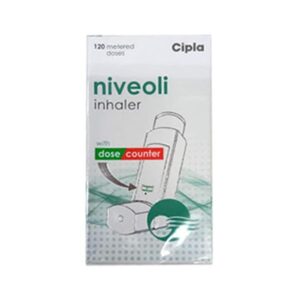SALBUTAMOL + BECLOMETHASONE COMBINATIONS
Salbutamol: Salbutamol, also known as albuterol, is a medication used to treat asthma, chronic obstructive pulmonary disease (COPD), and other respiratory conditions. It is classified as a selective beta-2 adrenergic agonist and belongs to the class of drugs called bronchodilators.
Salbutamol works by activating the beta-2 adrenergic receptors in the smooth muscles of the airways, leading to the relaxation of these muscles. This results in the dilation of the airways, making it easier for patients to breathe. It also helps to decrease the inflammation associated with asthma and COPD.
The drug is available in various forms, including inhalers (metered-dose inhalers or dry powder inhalers), nebulizer solutions, and tablets. The recommended dose and frequency of use depend on the severity of the condition being treated. For management of acute asthma symptoms, a typical dose for adults is 1 or 2 inhalations every 4-6 hours, as needed. For prevention of exercise-induced asthma, it is recommended to use 2 inhalations 15-30 minutes before exercise.
While Salbutamol is generally considered safe and effective, it can cause some side effects. Common side effects may include nervousness, tremors, headache, rapid heart rate (tachycardia), and increased blood pressure. These effects are usually mild and temporary. However, in rare cases, the drug can cause more serious side effects such as chest pain, irregular heartbeat, or allergic reactions. If any severe side effects or allergic reactions occur, medical attention should be sought immediately.
It is important to note that the above information is a summary and it is necessary to consult a healthcare professional or refer to the medication’s package insert for specific dosing instructions, precautions, and possible drug interactions.
Beclomethasone Combinations: Beclomethasone combinations refer to medications that contain beclomethasone dipropionate, a synthetic glucocorticoid, in combination with other drugs for the treatment of various respiratory conditions. It is administered via inhalation and helps to control and prevent symptoms such as wheezing, shortness of breath, and chest tightness.
The primary mechanism of action of beclomethasone is its anti-inflammatory effect on the airways. It works by reducing inflammation and swelling in the lungs, which helps to improve breathing. Beclomethasone also acts locally in the lungs and has minimal systemic effects, reducing the risk of many systemic side effects associated with systemic corticosteroids.
The dose of beclomethasone combinations can vary depending on the specific product and the condition being treated. It is typically administered as an inhalation spray using an inhaler or a nebulizer. The exact dose and frequency of use should be determined by a healthcare professional.
As with any medication, beclomethasone combinations can cause side effects. Some common side effects include throat irritation, hoarseness, coughing, and fungal infections in the mouth. These side effects can usually be minimized by rinsing the mouth with water after using the inhaler. In rare cases, systemic side effects such as adrenal suppression, osteoporosis, and cataracts may occur, especially with long-term use or at high doses. It is important to consult a doctor if any side effects are severe or persistent.
Beclomethasone combinations are generally safe and effective when used as prescribed. However, it is important to follow the recommended dose and discuss any concerns with a healthcare professional.

